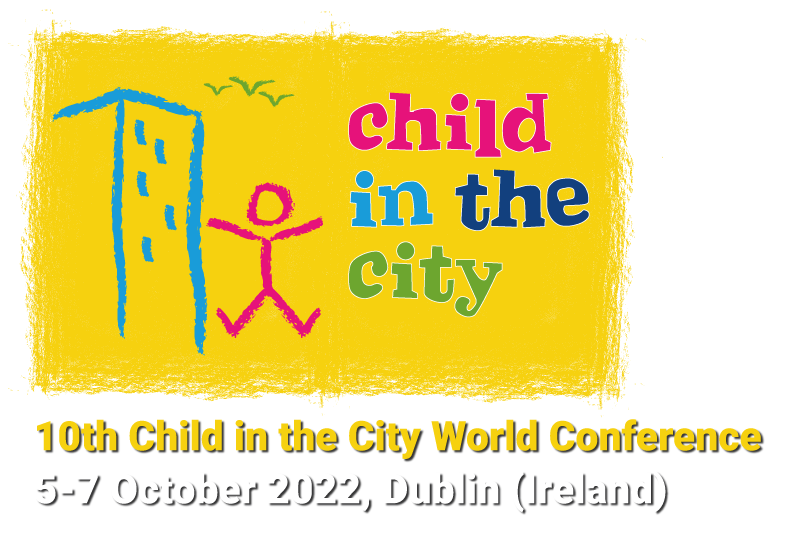Parallel session 3.1: Connecting children’s participation to urban policies
Wednesday, 5th October 16.00 – 17.30, Poddle Room in Printworks Conference Centre at Dublin Castle
 What do teenagers want ? Participatory methodologies with teenagers to develop outdoor facilities / resources (s) in their Town
What do teenagers want ? Participatory methodologies with teenagers to develop outdoor facilities / resources (s) in their Town
Carol Barron, Assistant Professor in Dublin City University, Ireland
Karinda Tolland
Mary-Jane Emmet
 Adult Allies and Ready Institutions Readying a City for Child Friendly Status
Adult Allies and Ready Institutions Readying a City for Child Friendly Status
Katherine Harford, Manager of Let’s Grow Together, Ireland
In the development of a Child Friendly City, the roles of adult allies and institutional developments are central. In 2021, in Cork city Ireland, allies came together to form a Child Friendly Cities Forum with embedded principals of children-participation and children’s rights, to work toward UNICEF Child Friendly City Initiative (CFCI) Status. Cork is at Phase 1, the discovery phase of the process, and is hoping to become the Republic of Ireland’s first UNICEF CFCI. Concepts of allies and readiness underpin this process, with key attitudes for enabling Cork to become a child friendly city. This paper explores important framework conditions which have enabled this attitudinal state of readiness (Holt et al, 2007) i.e.:
– The role of key adult allies for child participation and children’s rights in creating the context for change in Cork City.
– The role of key policy contexts and developments that have influenced the readiness of institutions to adopt a more main-streamed focus on child participation.
– Key initiatives that have brought allies together, built expertise, shared resources and momentum.
This paper includes literature review, documentary analysis from seminars, site visits, and Forum meetings. Key informant interviews with allies will identify factors which enabled or hindered the process. Findings will explore how adult allies influence readiness for a child-friendly city and what ancillary structures have supported this work. The outcome will be the identification of key enablers of social change and social reform in relation to mainstreaming children’s rights and participation for a Child Friendly city.
 Taking children’s knowledge seriously – A new model for analysis of children’s maps
Taking children’s knowledge seriously – A new model for analysis of children’s maps
Patrick Meehan, Northumbria University, United Kingdom
To promote greater awareness of the environmental, spatial, and sequential knowledge which children hold about their environment and to promote a new model for engaging with this knowledge in order to improve the ability of professionals to listen to children’s voices about their worlds. The ability of children to engage with issues of the design, construction and maintenance of their physical world is frequently underestimated by professionals and elected officials because of a lack of ways to gather the information and a reluctance to engage with children’s views in a manner consistent with the UNCRC (1989). This research is consistent with other recent studies which consistently show that children are fully capable of developing and articulating views about their physical environment if adults give them space to do so. The model derived through this research provides a framework which allows multi-disciplinary professionals to constructively engage with young children to gain their views on how the physical environment shapes their lives.

 Teens creativity and participatory practices in placemaking of urban school
Teens creativity and participatory practices in placemaking of urban school
Anastasiya Yrkevich, Architect at Landscape Architect Bureau “AFA”
Maria Sokolova, Consultant in designing children’s play environments at Landscape Architect Bureau “AFA”
The play environment for schoolchildren is a little-studied topic in Russia, so school territories look like unused areas: schoolchildren do not spend time on them during breaks and don’t use them after school. In 2020, we held a series of joint architectural workshops including research of the place made by kids, interviews with teachers and parents, public talks and modeling with teachers, students and their parents of the School 734 named after A. N. Tubelsky. As a result, we got a project that reflected the real interests of different groups of users of this territory. In 2021, this project received a state grant and funding. We expect that the project will be built next year. We would like to show our participatory design, which difficulties we had to face at each of the stages of work, and how we successfully overcame them in this project.
